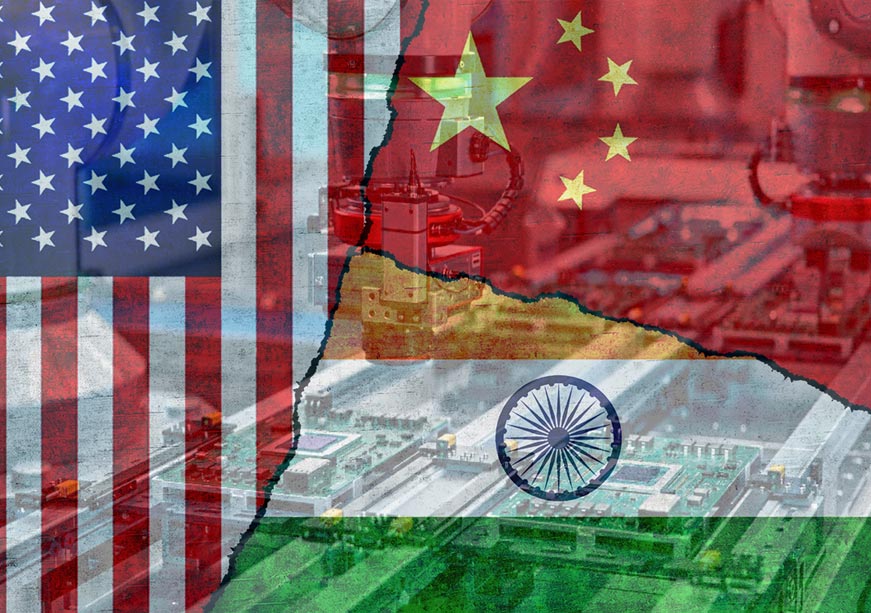This brief has investigated the phenomenon of freelancing on digital platforms. It explained its technological and economic drivers, reinforced by the impact of the Covid-19 pandemic, how these developments are playing out in India, and the promises and perils of this type of work. Addressing the challenges concerns various policy domains and relies on steps taken on both national and international levels. Policy proposals should be based on consultation of all relevant stakeholders, including representatives of freelancers, their clients, platform companies, and the government. Policy priorities rest on certain pillars.
On one hand, people need to be empowered to seize employment opportunities offered through freelancing platforms. One basic requirement for potential freelancers to enter the market and also get access to the global demand for freelancing services is affordable and reliable Internet access, especially in more remote places outside the metro cities. Moreover, in order to support the youth to find and succeed in online freelancing jobs, the curricula in education and vocational training institutions must be adapted to the requirements of the new digital working worlds. This includes equipping students with basic digital literacy and teaching them further technology-related skills. On the other hand, aspects where digital freelance work does not serve the goals of sustainable development need to be tackled. This means lowering informality and designing framework conditions in ways that ensure decent digital work opportunities for all. The most important labour standards must also apply to freelancers in order to guarantee a minimum amount of social security and protection.
India has taken steps to address the aforementioned challenges. However, they have not been sufficient. The enforcement of regulations is made difficult due to the cross-border nature of the phenomenon and the fact that freelancers, clients, and platforms are based in different jurisdictions. National policies, therefore, need to be complemented by international policy dialogue and coordination to develop a more effective and consistent approach to digital labour platforms worldwide as to ensure regulatory certainty and the applicability of universal labour standards.[40]
Sabrina Korreck is a Senior Fellow at ORF. The author thanks the anonymous reviewer for their valuable comments.
Endnotes
[a] This brief interchangeably uses ‘online gig workers’ and ‘freelancers’ to refer to those who work on demand for different companies (instead of for only one), often on a short-term basis, and are paid on a per-time or per-task basis.
[1] Niels Beereport, Bart Lambregts, “Competition in online job marketplaces: Towards a global labour market for outsourcing services?” Global Networks, 2015, 15(2), 236-255; “India largest supplier of workers on digital platforms: ILO,” Bloomberg Quint, February 23, 2021.
[2] Jon Younger, “Payoneer: Building the ecosystem for the freelance revolution,” Forbes, February 19, 2021.
[3] International Labour Organization (ILO), “World Employment and Social Outlook: The role of digital labour platforms in transforming the world of work,” February 23, 2021; International Labour Organization (ILO), “Digital labour platforms and the future of work: Towards decent work in the online work,” September 20, 2018.
[4] McKinsey Global Institute, “Digital globalization: The new era of global flows,” March 2016; Niels Beerepoot, Bart Lambregts, “Competition in online job marketplaces: Towards a global labour market for outsourcing services?” Global Networks, 15(2), p. 236-255.
[5] World Trade Organization, “World Trade Report 2019: The future of services trade,” 2019.
[6] Niels Beerepoot, Bart Lambregts, “Competition in online job marketplaces: Towards a global labour market for outsourcing services?” Global Networks, 15(2), p. 236-255.
[7] Richard Baldwin, “Digital technology and telemigration,” in: World Trade Organization, “World Trade Report 2019: The future of services trade,” 2019 .
[8] Niels Beereport, Bart Lambregts, “Competition in online job marketplaces: Towards a global labour market for outsourcing services?” Global Networks, 2015, 15(2), 236-255.
[9] Payoneer, “The 2020 Freelancer Income Report”.
[10] International Labour Organization (ILO), “World Employment and Social Outlook: The role of digital labour platforms in transforming the world of work,” February 23, 2021.
[11] International Labour Organization (ILO), “World Employment and Social Outlook: The role of digital labour platforms in transforming the world of work,” February 23, 2021.
[12] Richard Baldwin, “Digital technology and telemigration“, in: World Trade Organization, “World Trade Report 2019: The future of services trade,” 2019.
[13] Fabian Stephany, “How big is the online labour workforce? Our data-driven approach to this tricky question,” Oxford Internet Institute, The iLabour Project, March 24, 2021.
[14] McKinsey, “How Asia can prepare for the future of work after COVID-19,” April 8, 2021, Podcast (transcript).
[15] International Labour Organization (ILO), “World Employment and Social Outlook: The role of digital labour platforms in transforming the world of work,” February 23, 2021.
[16] Tina Zintl and Elvis Melia, “Is the pandemic deepening the digital divide?” German Development Institute, April 22, 2020.
[17] “India largest supplier of workers on digital platforms: ILO,” Bloomberg Quint, February 23, 2021.
[18] Hemani Sheth, “India is second-fastest-growing freelance market in the world, says report,” The Hindu BusinessLine, September 11, 2020.
[19] Terri Chapman, Samir Saran, Rakesh Sinha, Suchi Kedia, Sriram Gutta, “The future of work in India: Inclusion, growth and transformation,” Observer Research Foundation, October 2018.
[20] World Trade Organization, “World Trade Report 2019: The future of services trade,” 2019.
[21] Mark Graham, Isis Hjorth, Vili Lehdonvirta, “Digital labour and development: impacts of global digital labour platforms and the gig economy on worker livelihoods,” Transfer: European Review of Labour and Research, 2017, 23(2), 135-162.
[22] “India largest supplier of workers on digital platforms: ILO,” Bloomberg Quint, February 23, 2021.
[23] Fabian Stephany, “ILO report: The role of digital labour platforms in transforming the world of work,” Oxford Internet Institute, The iLabour Project, February 23, 2021.
[24] “India largest supplier of workers on digital platforms: ILO,” Bloomberg Quint, February 23, 2021; Fabian Stephany, “ILO report: The role of digital labour platforms in transforming the world of work,“ Oxford Internet Institute, The iLabour Project, February 23, 2021.
[25] Fabian Stephany, “ILO report: The role of digital labour platforms in transforming the world of work,” Oxford Internet Institute, The iLabour Project, February 23, 2021; Vili Lehdonvirta, “Where are online workers located? The international division of digital gig work,” Oxford Internet Institute, The iLabour Project, July 11, 2017.
[26] Hemani Sheth, “India is second-fastest-growing freelance market in the world, says report,” The Hindu BusinessLine, September 11, 2020.
[27] Categories as classified by ILO. See: “India largest supplier of workers on digital platforms: ILO,” Bloomberg Quint, February 23, 2021.
[28] Niels Beereport, Bart Lambregts, “Competition in online job marketplaces: Towards a global labour market for outsourcing services?” Global Networks, 2015, 15(2), 236-255.
[29] International Labour Organization (ILO), “World Employment and Social Outlook: The role of digital labour platforms in transforming the world of work,” February 23, 2021.
[30] Hemani Sheth, “India is second-fastest-growing freelance market in the world, says report,” The Hindu BusinessLine, September 11, 2020.
[31] Mark Graham, Isis Hjorth, Vili Lehdonvirta, “Digital labour and development: impacts of global digital labour platforms and the gig economy on worker livelihoods,” Transfer: European Review of Labour and Research, 2017, 23(2), 135-162.
[32] Niels Beereport, Bart Lambregts, “Competition in online job marketplaces: Towards a global labour market for outsourcing services?” Global Networks, 2015, 15(2), 236-255.
[33] Mark Graham, Isis Hjorth, Vili Lehdonvirta, “Digital labour and development: impacts of global digital labour platforms and the gig economy on worker livelihoods,” Transfer: European Review of Labour and Research, 2017, 23(2), 135-162.
[34] Niels Beereport, Bart Lambregts, “Competition in online job marketplaces: Towards a global labour market for outsourcing services?” Global Networks, 2015, 15(2), 236-255.
[35] Niels Beereport, Bart Lambregts, “Competition in online job marketplaces: Towards a global labour market for outsourcing services?” Global Networks, 2015, 15(2), 236-255.
[36] Mark Graham, Isis Hjorth, Vili Lehdonvirta, “Digital labour and development: impacts of global digital labour platforms and the gig economy on worker livelihoods,” Transfer: European Review of Labour and Research, 2017, 23(2), 135-162.
[37] International Labour Organization (ILO), “World Employment and Social Outlook: The role of digital labour platforms in transforming the world of work,” February 23, 2021.
[38] International Labour Organization (ILO), “World Employment and Social Outlook: The role of digital labour platforms in transforming the world of work,” February 23, 2021.
[39] International Labour Organization (ILO), “World Employment and Social Outlook: The role of digital labour platforms in transforming the world of work,” February 23, 2021.
[40] International Labour Organization (ILO), “World Employment and Social Outlook: The role of digital labour platforms in transforming the world of work,” February 23, 2021.

 PDF Download
PDF Download



 PREV
PREV


